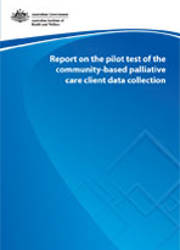Summary
The National Palliative Care Strategy (DoHA 2000), a consensus document and framework for the development of palliative care provision in Australia, identifies the need for high- quality data to support the delivery of effective and accountable palliative care services. The Strategy, which all Australian governments have committed to implement, identifies a range of information development activities as common goals in the development of palliative care services, especially in relation to 'accountability and reporting' objectives. This report outlines efforts to develop a proposed data set for community-based palliative care services that is relevant to national policy development and accountability, and provides details of a pilot test of the data set which aimed to evaluate the data items and their permissible values.
This project also occurs in the context of the 2003-08 Australian Health Care Agreements, which are the major mechanism by which the Australian Government disperses funds to the states and territories for the provision of healthcare services and outlines the states' and territories' obligations in respect of this funding. This work has been funded by the Australian Government Department of Health and Ageing and has been conducted by the Australian Institute of Health and Welfare in collaboration with the Palliative Care Data Working Group. This group includes representatives of all state and territory health departments and other stakeholders.
This data set lays the foundation for the future agreement of a national minimum data set, which would see the collection of ongoing data about community-based palliative care clients for national collection and reporting. The data items within the draft client data set specification (client DSS) include items that relate to: the patient (that is, the person with the life-limiting illness), the episode of palliative care, the episode of grief and bereavement counselling, and each service contact within these episodes.
The pilot test of the client DSS involved a national sample of palliative care agencies recruited by state and territory health authorities. The pilot test was conducted as a 'snapshot' survey conducted over a two-week period and used paper-based survey forms to collect relevant data to assess whether the data could be collected by palliative care agencies delivering services in community settings. The data items were then assessed in terms of: their practicality and the consistency of interpretation of the questions; the comprehensiveness of the range of possible answers; the quality of reported data; and respondent burden.
Overall, the pilot test was considered successful in demonstrating that data of this kind can be collected by palliative care agencies involved in delivering care to patients based in the community and that the quality of data collected was generally of a high standard. In particular, the pilot test demonstrated that data items relating to the patient and the episode of palliative care can be readily collected in a consistent manner by palliative care agencies but that some palliative care service contact data require finetuning. Further work will also be required to better define concepts relating to episodes of grief and bereavement counselling to ensure their consistent application by palliative care agencies. Suggestions to finetune a number of data items to further enhance the quality and consistency of data collected and to ensure comparability with other data collections are included in Chapter 3.
The issue of how best to collect service contact data (whether as part of an ongoing administrative data collection or a regular 'snapshot' survey) is raised, particularly because it is this component of the data set that is likely to be the greatest burden to service providers.
The report also draws attention to the need to consider a phased implementation of the data set, with items relating to the patient and the episode of palliative care being collected in the first instance, while further development and improvement is made to items relating to episodes of grief and bereavement counselling and service contacts. This will also allow time for palliative care agencies to modify their information systems and processes to capture the required data. The next steps to be taken in finalising the data set specification are also outlined.



